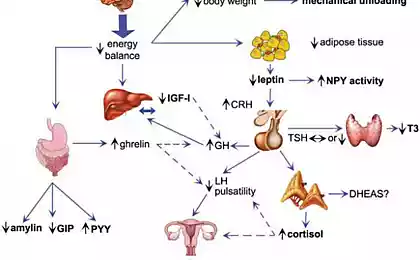664
The global myth of the progesterone — read for all women!
The second generation of women in our country "sits" on the progesterone. However, Western research shows that there is no "preserving" therapy in the early stages of pregnancy, as there is no effective drugs for this.
In our country on progesterone "grown" already at least one generation, which continues to "swallow" the same progesterone, nurturing their children. Nowhere in the world is such a craze these hormonal drugs, and many foreign doctors are often shocked that progesteronelike drugs are taken in a large number of our women. Progesterone has become something like chewing gum, without which our women are afraid to conceive and bear the children…
The idea of "universality of progesterone," which allegedly cures almost all female diseases, develop and maintain modern pharmaceutical company, manufacturing and selling the hormones, as this global myth created artificially and psychological dependence on progesterone, antiseptic, utrozhestane and the like brings fabulous profits to their manufacturers.
Ninety four million two hundred thirty four thousand three hundred eighteen
Progesterone during pregnancy
Progesterone is a hormone that is produced in the ovaries after ovulation and prepares the uterus for future pregnancy. If she does not come, produced approximately 10-14 days. If the pregnancy, it is produced by the corpus luteum in the ovary during the first 8 weeks (the average), supporting the development of the pregnancy.
On this basis all patients have concluded that if there is a loss of pregnancy (it be a blighted ovum, missed miscarriage, spontaneous abortion), it means that progesterone was not enough and that pregnancy was lost. But this is not in fact absolute-preabsonite most cases!
The opposite is happening: the embryo dies (because of the broken genetics of malformations, due to the impact of acute viral infection, which can be symptomatic and asymptomatic, due to reasons that are still unknown to medical science), sends a signal that progesterone production is no longer needed because the embryo stopped its development, the level of progesterone begins to fall, in response to this started the process of rejection of the lost of the pregnancy from the wall of the uterus, which ultimately results in bleeding (remark: the appearance of vaginal bleeding in pregnancy does not always mean that the pregnancy was lost) and causes a miscarriage (which is actually what is called in medicine a spontaneous miscarriage).
Ie is primary not a small amount of progesterone (and because of this, the miscarriage), and the primary the death of the pregnancy and, in response, there is a decrease in progesterone. So the woman takes the progesterone or pregnancy with bleeding or without them the chances of pregnancy does not change (there are exceptions to this rule — more on that below).
So nowhere, except Russia, there is no Orgy in prescribing progesterone: you have pain in the stomach — receive the progesterone, your age older than 35 years receive the progesterone, your uterine — receive the progesterone, and you had sukrovichnye/spotting amid pregnancy receive medications progesterone, you have a detachment of the chorion/placenta by ultrasound — receive the progesterone. Here is a typical Russian examples purpose of progesterone during pregnancy.
And according to evidence-based medicine, progesterone during pregnancy is assigned:
In addition, for the purpose of progesterone during pregnancy in the right situations that did not require a blood test for progesterone.It doesn't require a blood test for progesterone and for those who are already taking progesterone in conjunction with those medical situations (habitual miscarriage, IVF, premature birth, short neck).
A blood test for progesterone during pregnancy — do not interesting, because according to his result, do not make any final predictions about pregnancy ( will develop pregnancy). Such predictions are made on the basis of results of ultrasonography and/or analysis of HCG (human chorionic gonadotropin is another hormone that begins to be produced during pregnancy; on the analysis of HCG in your urine-based pregnancy test).
Why pregnant as a result of IVF need to take progesterone? In women who were transplanted embryos, your yellow body of pregnancy is not, so there is no body to produce progesterone in sufficient quantity to till the placenta will take over this role. It turns out that if after IVF not support pregnancy additional progesterone, replanting embryo will not be successful in most cases. Here without of this hormone can not do.
And what happens to a healthy woman? If a woman has normal regular cycles and she got pregnant spontaneously in the course of the year without the intervention of doctors — it is a normal, healthy conception. Hence, the levels of hormones a woman right. Why does she have to appoint additional hormones? For what?
Defective fertilized egg may not implant properly so HCG levels were not rising as it does in a normal pregnancy, the corpus luteum of pregnancy does not support this pregnancy production of sufficient quantities of progesterone — she interrupted. And how not to introduce progesterone will not help. Tried to enter HCG with progesterone, but the results were the same — does not help. Why? The fertilized egg is already defective since its origin, therefore, from the point of view of nature, the normal offspring from it will not work. But our doctors about the least think or know, and that's why they prescribe hormones to all women "just in case".
Reproductive medicine has helped to solve two other issues — the treatment of repeated spontaneous miscarriages and the success of IVF (artificial insemination) due to additional administration of progesterone. A number of women with repeated spontaneous miscarriages are associated with progesterone deficiency (luteal) phase. And it's not a full egg, and the poor preparation of the uterus to the adoption of the ovum. Usually a luteal phase deficiency is associated with failure of the first phase of the menstrual cycle (estrogenovmi), but if there is a maturation of the egg, though belated, it is already good. Therefore, the second phase becomes more important for the implantation process. Women suffering from luteal phase deficiency, not much, just this diagnosis doctors abuse of post-Soviet States.
Scientists from different countries of the world have conducted much research on the issues of "preserving" therapy in the early stages of pregnancy, and in one voice declare that such therapy is available. It turns out that all those drugs, who at least once tried to apply for the preservation or continuation of pregnancy, are not effective. What, then, effectively? Oddly enough, the psychological factor, the woman's faith in a positive outcome, are often better than any drugs. For most women, progesterone is only a pacifier, a sedative pill, without which she has no faith in the positive outcome of the pregnancy. And this woman taught doctors, friends, acquaintances. And to this she taught her daughters...
Twelve million four hundred fifteen thousand three hundred thirty five
Some statistics, or the risk is always there
The frequency of miscarriages is large enough: they end in 15-20% of pregnancies.
That is, for the practitioner this is a very common situation, although in the life of every person, of course, this can only happen once or not happen at all.
Medical statistics, which allows to transfer the medicine into the language of figures and make it more exact science, says that of those 15-20% of pregnancies ending in miscarriage, 80% or more occur in the first 12 weeks. That is, the greater the gestation, the less chance there'll be a spontaneous miscarriage.
Thus, if a woman with a diagnosis of "threatened miscarriage" on the ultrasound and see a fetus with a heartbeat, chance of miscarriage is no longer 15%, and 5% to pregnancy more than 12 weeks — the probability is 2-3%, but it will never be zero. Because in medicine, as in life, nothing happens with zero and 100% probability. When the pregnancy is 22 weeks pregnant will hang over the likelihood of premature birth 10% .
All of these numbers is the so — called population-based risks that weigh over the head of any woman, taking it the progesterone or not.
Medical statistics shows that more than half of spontaneous miscarriages in the first 12 weeks due to genetic abnormalities in the fetus.
And the earlier the gestation, the higher the probability that the cause was a genetic disorder in the fetus. This generalized data of numerous studies, mostly Western. The fact is that whatever the kings of nature itself or we fancied, we are subject to the same laws of nature, that the ant, a bug, a blade of grass.
These biological laws has not been canceled: survival of the best and strongest in the best sense of the word, in the biological sense.
Biological the individual may not always deliver 100 percent quality of cells (in this case we are talking about sex cells). So, in 1 ml of semen men on average contains 20 million sperm, and about 10% of them, there are 2 million pathological forms. Such a semen analysis is considered normal. A woman also may Mature not very high quality eggs, and the older we get, the more likely it is that ripe egg of poor quality. It's not because we deliberately do something wrong – lifted something heavy, had too much to drink a Cup of coffee, overworked at home/at work. Unlike sperm, which are constantly updated, all oocytes of women of the future are laid in the time when her mother is 20 weeks pregnant.
And new eggs laid more than ever, they just spent, only to be lost throughout the lives of girls/women.
I.e. if you are 35 years of age, the egg that is released from the ovary you have this month, had been in the ovary waiting for their turn to ovulation for more than 35 years. So, of course, 20-year-old and 40-year-old woman not only the quantity but also the quality of the egg will be different. Because at first all the negative that is around us in terms of food, environment, air and water, operates only 20 years old, and the second – already 40. Therefore, pregnancy tighten not worth it.
Eighty million two hundred sixty five thousand two hundred eighty six
Two worlds, two approaches
With the threat of miscarriage in women actions of a doctor in Russia and abroad are fundamentally different, and it is not caused by so many different scientific data, but the cultural differences encountered during the isolation of our medical school. Abroad, these women are simply sent home: they are "prescribed" bed rest, General clinical examination, pelvic rest. Time will tell what the outcome of this situation: either the pregnancy continues, or happens to have a miscarriage, if she was laid poorly, and it's good that she was "rejected" by the body.
In Russia a bit different is the psychological attitude of the population to medicine, different medicine.
We have a threatened miscarriage is a necessary indication for hospitalization: the patient is prescribed "Nospanum", drugs-tocolytics, which relax the uterus, hemostatic drugs. It's not a question of biological or medical differences is a question of psychology the greater part of our population: if the doctor gave the pill, so he was not eager to help.
And it can be difficult to convey to people that there are laws of nature — they will not be affected. In our opinion, the Russian, the Protocol the doctor has no right not to offer admission at the threat of miscarriage. However, scientific medical facts clearly demonstrate that hospitalization, nothing changes in the forecast: chance of miscarriage from this is not reduced.
Western studies show that there is no medication that cope with spontaneous miscarriage. If the pregnancy is saved, it saves the nature of pregnancy, not treatment. For habitual miscarriage such medications is: if you were able to identify the cause of repeat abortions, it is possible to influence. This treatment is prescribed even either before pregnancy or in the early stages of pregnancy, before the appearance of any symptoms of threatened miscarriage.
It is important to understand that nothing can be done to reduce the likelihood of recurrence interrupt during subsequent pregnancies to zero.
Even if you make all the necessary and unnecessary tests (which is, unfortunately, very common), carried out the necessary treatment, the likelihood that miscarriage will recur, on average, the same 15-20%.
Fifteen million five hundred eighty seven thousand seven hundred seventy three
So whether harmless drug progesterone?
In the 70-ies in the United States was widely used synthetic progesterone, women in the first trimester of pregnancy. And suddenly there is evidence that synthetic progesterone can cause the emergence of a small (small) malformations in the fetus, especially of the genital organs of girls and boys.
The Federal drug administration USA (FDA) banned the use of progesterone in pregnant women in the first trimester, and in the instructions for use of the drug appeared the statement "intake of progesterone is contraindicated in pregnancy up to 4 months, as it can cause small fetal malformations," and then came a detailed description of all the types of vices that have been registered in cases where women have used progesterone in the first trimester.
In addition, proven link between progesteronelike drugs and increased risk of ectopic pregnancy. Abroad, the level of ectopic pregnancy is extremely low — this is a rare condition. But our women are intimidated ectopic pregnancy extremely.
And I always wondered: do the women have a risk of ectopic pregnancies is higher than in women of other countries? It turns out that our women have reason to fear high-level ectopic pregnancy because almost all of our women are "poisoned" by progesterone. What say you doctors when prescribe progesterone? It supposedly relaxes the uterus, reduces its contraction and helps implantation.
The fact that normally the uterus for implantation of additional progesterone is not needed, but none of the doctors thinks that the fallopian tube is also created from the muscles and the timely progress of the ovum through the fallopian tube contraction (motility) fallopian tubes must not be disturbed. The progesterone decreases the motility of the fallopian tubes. This leads to the fact that a fertilized egg may not reach the uterus in time and can be stuck in the fallopian tube. You have to understand that taking progesterone you increase the risk of ectopic pregnancy.
Michel odent on the autopsy of membranes and ultrasound after birthWhy can't I get pregnant — obvious reasons
Besides, the purpose of progesterone in our country the dependence of women, often preparing to become a mother, and especially pregnant women, from any kind of tablets, injections, droppers, candles and other addiction artificially created fear that without medicine pregnancy will not progress and will end its interrupt. Thus, the pill, most women have become a mandatory attribute of their lives, and especially when they are all friends, colleagues, relatives, acquaintances harbored pregnancy "progesterone". published
Learn more about progesterone, its impact on a woman's body and the unborn child can be read in the book of the obstetrician-gynecologist Elena Berezovskaya "Hormone therapy in obstetrics and gynecology: illusions and reality"
Source: www.kramola.info/vesti/metody-genocida/progesteronovaya-naciya
In our country on progesterone "grown" already at least one generation, which continues to "swallow" the same progesterone, nurturing their children. Nowhere in the world is such a craze these hormonal drugs, and many foreign doctors are often shocked that progesteronelike drugs are taken in a large number of our women. Progesterone has become something like chewing gum, without which our women are afraid to conceive and bear the children…
The idea of "universality of progesterone," which allegedly cures almost all female diseases, develop and maintain modern pharmaceutical company, manufacturing and selling the hormones, as this global myth created artificially and psychological dependence on progesterone, antiseptic, utrozhestane and the like brings fabulous profits to their manufacturers.
Ninety four million two hundred thirty four thousand three hundred eighteen
Progesterone during pregnancy
Progesterone is a hormone that is produced in the ovaries after ovulation and prepares the uterus for future pregnancy. If she does not come, produced approximately 10-14 days. If the pregnancy, it is produced by the corpus luteum in the ovary during the first 8 weeks (the average), supporting the development of the pregnancy.
On this basis all patients have concluded that if there is a loss of pregnancy (it be a blighted ovum, missed miscarriage, spontaneous abortion), it means that progesterone was not enough and that pregnancy was lost. But this is not in fact absolute-preabsonite most cases!
The opposite is happening: the embryo dies (because of the broken genetics of malformations, due to the impact of acute viral infection, which can be symptomatic and asymptomatic, due to reasons that are still unknown to medical science), sends a signal that progesterone production is no longer needed because the embryo stopped its development, the level of progesterone begins to fall, in response to this started the process of rejection of the lost of the pregnancy from the wall of the uterus, which ultimately results in bleeding (remark: the appearance of vaginal bleeding in pregnancy does not always mean that the pregnancy was lost) and causes a miscarriage (which is actually what is called in medicine a spontaneous miscarriage).
Ie is primary not a small amount of progesterone (and because of this, the miscarriage), and the primary the death of the pregnancy and, in response, there is a decrease in progesterone. So the woman takes the progesterone or pregnancy with bleeding or without them the chances of pregnancy does not change (there are exceptions to this rule — more on that below).
So nowhere, except Russia, there is no Orgy in prescribing progesterone: you have pain in the stomach — receive the progesterone, your age older than 35 years receive the progesterone, your uterine — receive the progesterone, and you had sukrovichnye/spotting amid pregnancy receive medications progesterone, you have a detachment of the chorion/placenta by ultrasound — receive the progesterone. Here is a typical Russian examples purpose of progesterone during pregnancy.
And according to evidence-based medicine, progesterone during pregnancy is assigned:
- women with a history of habitual abortion (two spontaneous miscarriage in a row);
- women who have a pregnancy in the IVF program;
- women with a history of premature birth (birth before 37 weeks of pregnancy)
- women with a short cervix by ultrasound in the period 20-22 weeks (in the West, the appointment of the drug in this case is debatable).
In addition, for the purpose of progesterone during pregnancy in the right situations that did not require a blood test for progesterone.It doesn't require a blood test for progesterone and for those who are already taking progesterone in conjunction with those medical situations (habitual miscarriage, IVF, premature birth, short neck).
A blood test for progesterone during pregnancy — do not interesting, because according to his result, do not make any final predictions about pregnancy ( will develop pregnancy). Such predictions are made on the basis of results of ultrasonography and/or analysis of HCG (human chorionic gonadotropin is another hormone that begins to be produced during pregnancy; on the analysis of HCG in your urine-based pregnancy test).
Why pregnant as a result of IVF need to take progesterone? In women who were transplanted embryos, your yellow body of pregnancy is not, so there is no body to produce progesterone in sufficient quantity to till the placenta will take over this role. It turns out that if after IVF not support pregnancy additional progesterone, replanting embryo will not be successful in most cases. Here without of this hormone can not do.
And what happens to a healthy woman? If a woman has normal regular cycles and she got pregnant spontaneously in the course of the year without the intervention of doctors — it is a normal, healthy conception. Hence, the levels of hormones a woman right. Why does she have to appoint additional hormones? For what?
Defective fertilized egg may not implant properly so HCG levels were not rising as it does in a normal pregnancy, the corpus luteum of pregnancy does not support this pregnancy production of sufficient quantities of progesterone — she interrupted. And how not to introduce progesterone will not help. Tried to enter HCG with progesterone, but the results were the same — does not help. Why? The fertilized egg is already defective since its origin, therefore, from the point of view of nature, the normal offspring from it will not work. But our doctors about the least think or know, and that's why they prescribe hormones to all women "just in case".
Reproductive medicine has helped to solve two other issues — the treatment of repeated spontaneous miscarriages and the success of IVF (artificial insemination) due to additional administration of progesterone. A number of women with repeated spontaneous miscarriages are associated with progesterone deficiency (luteal) phase. And it's not a full egg, and the poor preparation of the uterus to the adoption of the ovum. Usually a luteal phase deficiency is associated with failure of the first phase of the menstrual cycle (estrogenovmi), but if there is a maturation of the egg, though belated, it is already good. Therefore, the second phase becomes more important for the implantation process. Women suffering from luteal phase deficiency, not much, just this diagnosis doctors abuse of post-Soviet States.
Scientists from different countries of the world have conducted much research on the issues of "preserving" therapy in the early stages of pregnancy, and in one voice declare that such therapy is available. It turns out that all those drugs, who at least once tried to apply for the preservation or continuation of pregnancy, are not effective. What, then, effectively? Oddly enough, the psychological factor, the woman's faith in a positive outcome, are often better than any drugs. For most women, progesterone is only a pacifier, a sedative pill, without which she has no faith in the positive outcome of the pregnancy. And this woman taught doctors, friends, acquaintances. And to this she taught her daughters...
Twelve million four hundred fifteen thousand three hundred thirty five
Some statistics, or the risk is always there
The frequency of miscarriages is large enough: they end in 15-20% of pregnancies.
That is, for the practitioner this is a very common situation, although in the life of every person, of course, this can only happen once or not happen at all.
Medical statistics, which allows to transfer the medicine into the language of figures and make it more exact science, says that of those 15-20% of pregnancies ending in miscarriage, 80% or more occur in the first 12 weeks. That is, the greater the gestation, the less chance there'll be a spontaneous miscarriage.
Thus, if a woman with a diagnosis of "threatened miscarriage" on the ultrasound and see a fetus with a heartbeat, chance of miscarriage is no longer 15%, and 5% to pregnancy more than 12 weeks — the probability is 2-3%, but it will never be zero. Because in medicine, as in life, nothing happens with zero and 100% probability. When the pregnancy is 22 weeks pregnant will hang over the likelihood of premature birth 10% .
All of these numbers is the so — called population-based risks that weigh over the head of any woman, taking it the progesterone or not.
Medical statistics shows that more than half of spontaneous miscarriages in the first 12 weeks due to genetic abnormalities in the fetus.
And the earlier the gestation, the higher the probability that the cause was a genetic disorder in the fetus. This generalized data of numerous studies, mostly Western. The fact is that whatever the kings of nature itself or we fancied, we are subject to the same laws of nature, that the ant, a bug, a blade of grass.
These biological laws has not been canceled: survival of the best and strongest in the best sense of the word, in the biological sense.
Biological the individual may not always deliver 100 percent quality of cells (in this case we are talking about sex cells). So, in 1 ml of semen men on average contains 20 million sperm, and about 10% of them, there are 2 million pathological forms. Such a semen analysis is considered normal. A woman also may Mature not very high quality eggs, and the older we get, the more likely it is that ripe egg of poor quality. It's not because we deliberately do something wrong – lifted something heavy, had too much to drink a Cup of coffee, overworked at home/at work. Unlike sperm, which are constantly updated, all oocytes of women of the future are laid in the time when her mother is 20 weeks pregnant.
And new eggs laid more than ever, they just spent, only to be lost throughout the lives of girls/women.
I.e. if you are 35 years of age, the egg that is released from the ovary you have this month, had been in the ovary waiting for their turn to ovulation for more than 35 years. So, of course, 20-year-old and 40-year-old woman not only the quantity but also the quality of the egg will be different. Because at first all the negative that is around us in terms of food, environment, air and water, operates only 20 years old, and the second – already 40. Therefore, pregnancy tighten not worth it.
Eighty million two hundred sixty five thousand two hundred eighty six
Two worlds, two approaches
With the threat of miscarriage in women actions of a doctor in Russia and abroad are fundamentally different, and it is not caused by so many different scientific data, but the cultural differences encountered during the isolation of our medical school. Abroad, these women are simply sent home: they are "prescribed" bed rest, General clinical examination, pelvic rest. Time will tell what the outcome of this situation: either the pregnancy continues, or happens to have a miscarriage, if she was laid poorly, and it's good that she was "rejected" by the body.
In Russia a bit different is the psychological attitude of the population to medicine, different medicine.
We have a threatened miscarriage is a necessary indication for hospitalization: the patient is prescribed "Nospanum", drugs-tocolytics, which relax the uterus, hemostatic drugs. It's not a question of biological or medical differences is a question of psychology the greater part of our population: if the doctor gave the pill, so he was not eager to help.
And it can be difficult to convey to people that there are laws of nature — they will not be affected. In our opinion, the Russian, the Protocol the doctor has no right not to offer admission at the threat of miscarriage. However, scientific medical facts clearly demonstrate that hospitalization, nothing changes in the forecast: chance of miscarriage from this is not reduced.
Western studies show that there is no medication that cope with spontaneous miscarriage. If the pregnancy is saved, it saves the nature of pregnancy, not treatment. For habitual miscarriage such medications is: if you were able to identify the cause of repeat abortions, it is possible to influence. This treatment is prescribed even either before pregnancy or in the early stages of pregnancy, before the appearance of any symptoms of threatened miscarriage.
It is important to understand that nothing can be done to reduce the likelihood of recurrence interrupt during subsequent pregnancies to zero.
Even if you make all the necessary and unnecessary tests (which is, unfortunately, very common), carried out the necessary treatment, the likelihood that miscarriage will recur, on average, the same 15-20%.
Fifteen million five hundred eighty seven thousand seven hundred seventy three
So whether harmless drug progesterone?
In the 70-ies in the United States was widely used synthetic progesterone, women in the first trimester of pregnancy. And suddenly there is evidence that synthetic progesterone can cause the emergence of a small (small) malformations in the fetus, especially of the genital organs of girls and boys.
The Federal drug administration USA (FDA) banned the use of progesterone in pregnant women in the first trimester, and in the instructions for use of the drug appeared the statement "intake of progesterone is contraindicated in pregnancy up to 4 months, as it can cause small fetal malformations," and then came a detailed description of all the types of vices that have been registered in cases where women have used progesterone in the first trimester.
In addition, proven link between progesteronelike drugs and increased risk of ectopic pregnancy. Abroad, the level of ectopic pregnancy is extremely low — this is a rare condition. But our women are intimidated ectopic pregnancy extremely.
And I always wondered: do the women have a risk of ectopic pregnancies is higher than in women of other countries? It turns out that our women have reason to fear high-level ectopic pregnancy because almost all of our women are "poisoned" by progesterone. What say you doctors when prescribe progesterone? It supposedly relaxes the uterus, reduces its contraction and helps implantation.
The fact that normally the uterus for implantation of additional progesterone is not needed, but none of the doctors thinks that the fallopian tube is also created from the muscles and the timely progress of the ovum through the fallopian tube contraction (motility) fallopian tubes must not be disturbed. The progesterone decreases the motility of the fallopian tubes. This leads to the fact that a fertilized egg may not reach the uterus in time and can be stuck in the fallopian tube. You have to understand that taking progesterone you increase the risk of ectopic pregnancy.
Michel odent on the autopsy of membranes and ultrasound after birthWhy can't I get pregnant — obvious reasons
Besides, the purpose of progesterone in our country the dependence of women, often preparing to become a mother, and especially pregnant women, from any kind of tablets, injections, droppers, candles and other addiction artificially created fear that without medicine pregnancy will not progress and will end its interrupt. Thus, the pill, most women have become a mandatory attribute of their lives, and especially when they are all friends, colleagues, relatives, acquaintances harbored pregnancy "progesterone". published
Learn more about progesterone, its impact on a woman's body and the unborn child can be read in the book of the obstetrician-gynecologist Elena Berezovskaya "Hormone therapy in obstetrics and gynecology: illusions and reality"
Source: www.kramola.info/vesti/metody-genocida/progesteronovaya-naciya
Scientists have discovered how the human brain adapts to lies
Reliable way to make people believe what is not true























